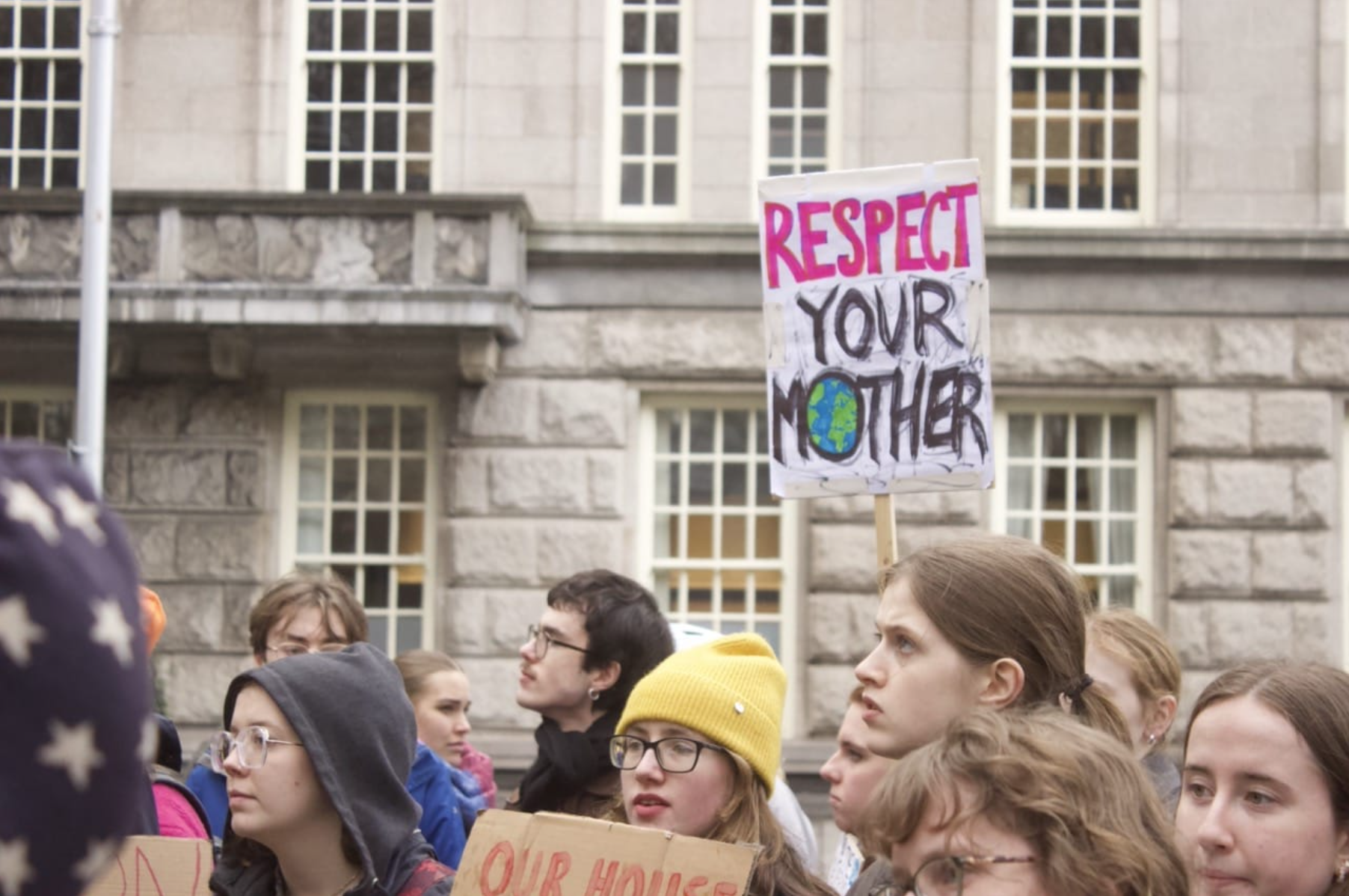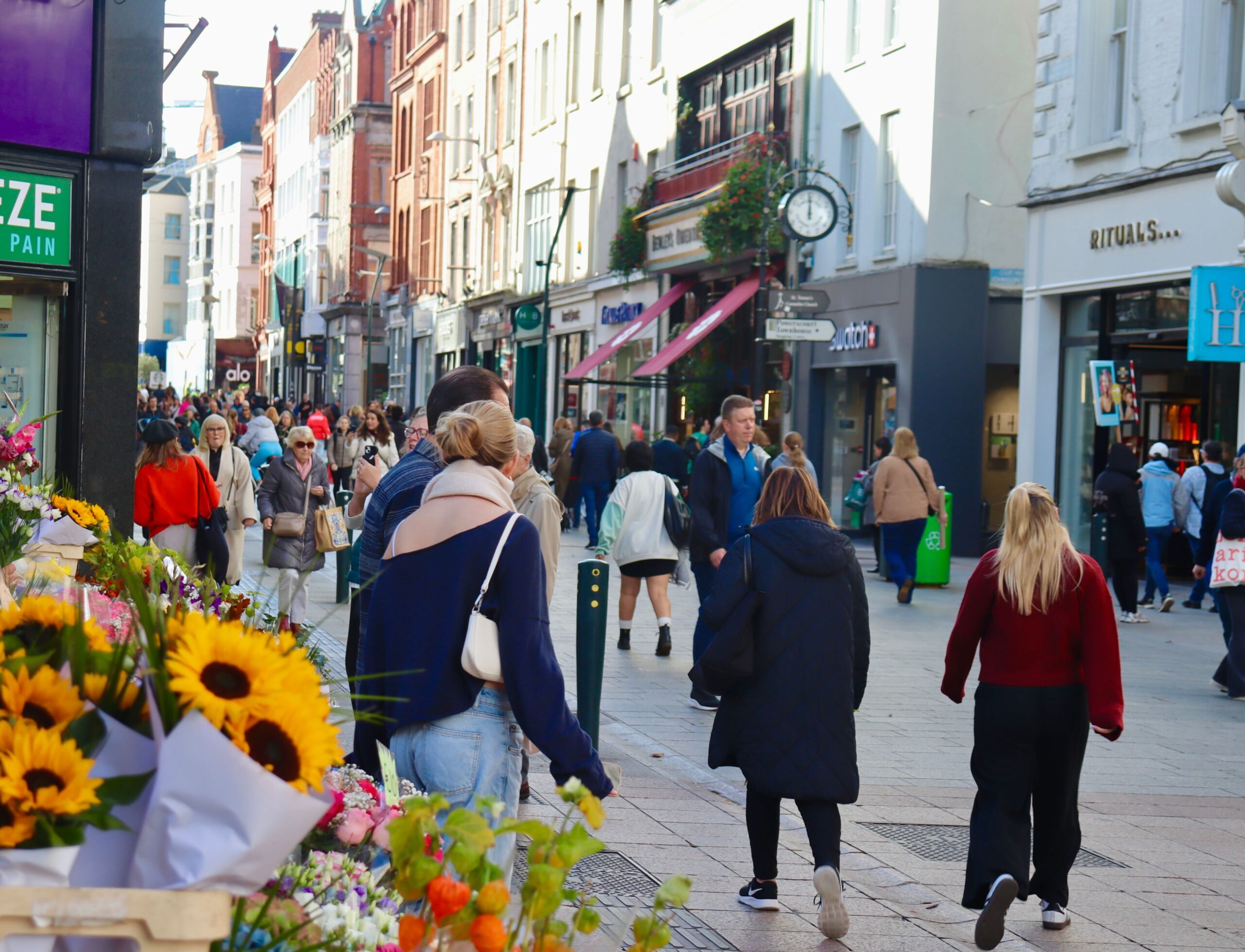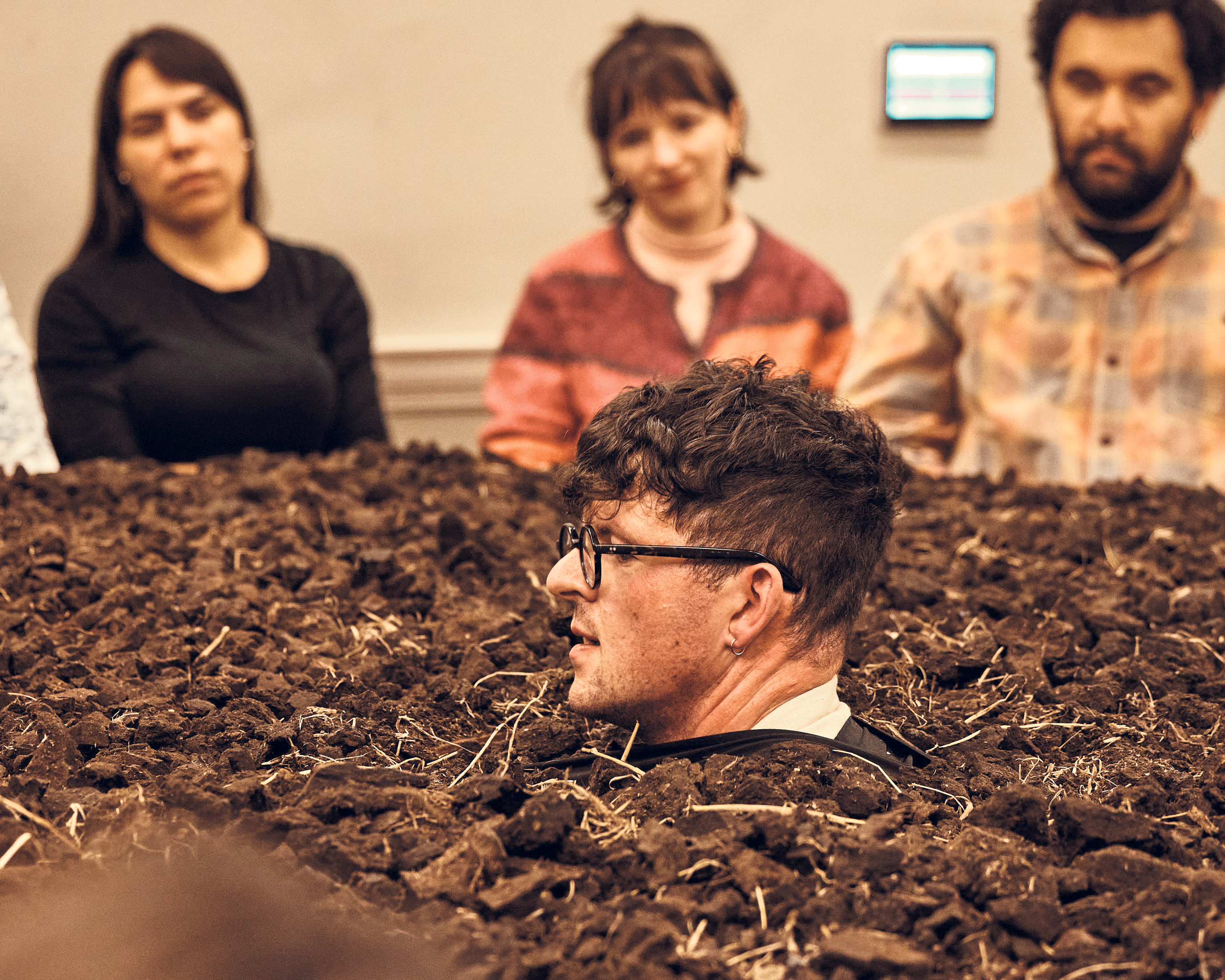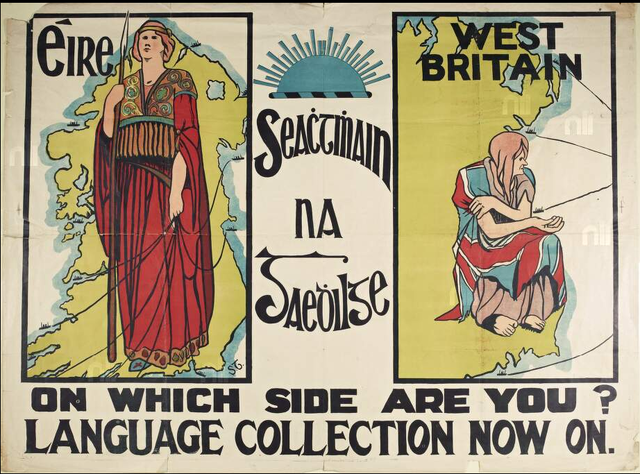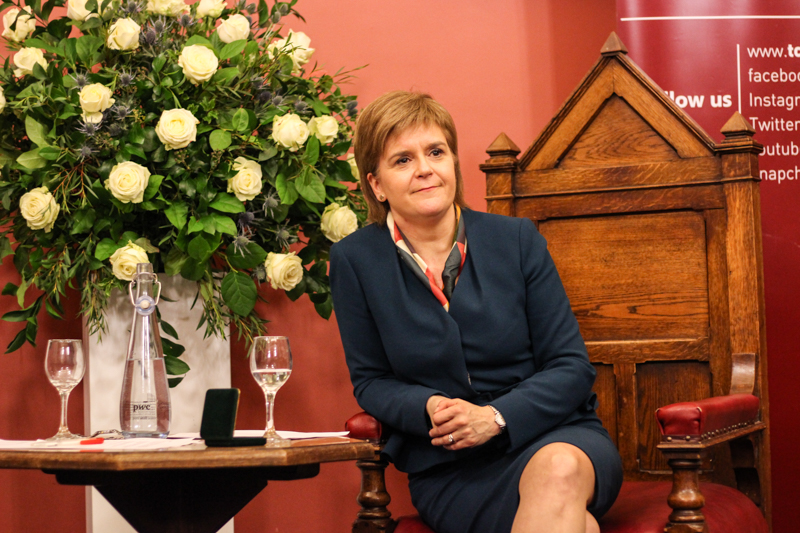
In an event that managed to combine sharp wit and insightful answers on the biggest issues facing global politics, the First Minister of Scotland, Nicola Sturgeon, addressed the University Philosophical Society (the Phil) this evening with a speech that focused on the value of education and the challenges facing progressive politics both in Scotland and further afield.
Sturgeon, who is the Leader of the Scottish National Party (SNP) has been in the position of First Minister since November 2014, following the resignation of former leader Alex Salmond after the failure of his referendum on Scottish independence. Sturgeon is the first female First Minister of Scotland, leading the third largest party in the UK by membership and the largest political party in Scotland.
After entering to boisterous applause, and stating that it was a “great honour” to receive the Gold Medal of Honorary Patronage from the Phil, she displayed her sense of humour and in-depth knowledge of Trinity, joking that one of her advisors, Ewan Crawford, had been a student in Trinity. Crawford had been a member of the College Historical Society (the Hist), with Sturgeon quipping that she hoped that his judgement had since improved.
Sturgeon’s in-depth knowledge of the College, which was displayed as she referenced Trinity’s standing as a top-100 university and famous alumni such as Edmund Burke and Mary Robinson, set the tone for what was a passionate endorsement of education, something that she emphasised is all the more important in the current political climate.
This point was pressed by Trinity College Dublin Students’ Union (TCDSU) President, Kieran McNulty, who, in looking at the Scottish education system, where Scottish students do not pay fees, questioned whether there was pressure to change this system, and whether it was working.
“I believe that kind of investment is an investment in the future”, Sturgeon responded. Acknowledging that there are gaps in the system in terms of access, “free tuition does not magically take that gap away”, she reiterated her belief that Scotland was on the right path.
“I was the first member of my family to go to university”, Sturgeon stated. “Universities are not just the places we go to get qualifications, Universities help shape the kind of people we become.” For Sturgeon, it is now “more important than ever before to stand up for and to champion” progressive values, referring to the fact that universities provide people with an opportunity to meet people of diverse backgrounds, something that is “more important now than it has perhaps ever been before”.

This “now” is a world in which Michael Gove, then-Secretary of State for Justice of the UK, stated that people in the UK “have had enough of experts”. Sturgeon contrasted this comment with her own panel of advisors that are aiding the Scottish government’s reaction to June’s Brexit result.
This result demonstrated the changing attitudes in the UK, Sturgeon stated, as she referenced the infamous bus of the leave campaign that implied the £350 million a week spent on EU membership would go towards the National Service (NHS), comparing this promise to the reality now.
“What are a few facts between friends?”, she said in jest, to much laughter.
Being able to debate the meaning of facts is, Sturgeon told the room, the “essence of politics”. During her lifetime, she stated, political debate was done based on an established body of facts. “Facts and knowledge do really matter. That respect for evidence is something universities teach us and instill in us.” But in the time when the Oxford English Dictionary chooses “post-truth” as the word of the year, how can we make sure that society values these facts?
On this, Sturgeon repeatedly returned to the topics of social media and, indeed, education. While praising social media for bringing politicians and the public “much closer together”, she stated that, in her admitted capacity as an “an enthusiastic Tweeter”, when engaging on social media, we “should do so in civil and respectful manner”. This, she emphasised, was, like so many things, more important than ever.
Both online and off, Sturgeon stated that it was important “to disagree vigilantly, but still be tolerant and respectful of different points of view”. She further emphasised this in response to a question from an audience member, who referenced how it currently “feels like we’ve fallen off a cliff” in terms of progress.
Despite these “setbacks”, Sturgeon noted that she remains “hugely optimistic for the future”, aided by her belief that “those of us on the progressive, centre-left of politics have assumed and taken for granted” that certain arguments have prevailed. Instead, she stated that “the progress that we have secured can never be undone… you have got to always be out the protecting the progress”. These setbacks, she hopes, “can help us shake ourselves out of this complacency that we have perhaps fallen into”.
One area where the SNP have not been complacent, however, is in their attempts to navigate the results of the Brexit referendum. In light of Scotland’s rejection of Brexit, which saw 64 per cent of Scottish voters voting against leaving the EU, Sturgeon has repeatedly stated that she does not wish to see Scotland taken out of the EU against its will, suggesting the possibility of a second independence referendum for Scotland, after 2014’s referendum failed by 10.6 percentage points.
The questions as to whether Scotland will seek to become independent from the UK, re-join the EU or attempt to re-enter the single market if the UK is expelled, remain, for now, unanswered, but Sturgeon has been clear about the mandate she has received from the Scottish people.
Indeed, when Phil President, Matthew Nuding, began to ask a question about Scottish independence, Sturgeon jumped in before its conclusion with a statement met with cheers from the room: “I support it!”
One question from the audience highlighted how a large portion of SNP voters voted in favour of Brexit, putting them in an “awkward” position. At the heart of this debate, Sturgeon offered, “is a pretty basic fundamental democratic question and that is: who decides?’” Drawing attention to the low support for the Conservative Party in Scotland and their contrasting power over the lives of Scottish people, she ultimately concluded: “Who gets to takes the decisions about Scotland’s future… shouldn’t it be the Scottish people?”
Sturgeon was quick to highlight how the party was re-elected in May “on the strength of a manifesto” that Scotland would hold a referendum to leave the UK should the opt to leave the EU.
“At the end of the day, if Scotland is faced with the prospect of not just being taken out of the EU but out of the single market… that is not the prospect that we voted for in 2014”.
Salmond spoke to Trinity’s law society (Law Soc) last year, focusing largely on the Scottish independence referendum, which had failed the year before, resulting in his recognition from his position as First Minister. Salmond then expressed confidence that, despite the referendum result, “the train is going to end up at the independence station”.
Even the name of Salmond’s book, The Dream Shall Never Die: 100 Days That Changed Scotland Forever reflected Salmond’s view that independence was inevitable.
Salmond was, of course, writing in an entirely different political landscape. In 2014, a Scotland voting to leave the UK could have been classified as the political event of the year – a huge upset or a historic victory, depending on who you asked. In 2016, such a move would be comparatively dwarfed by the year’s events, and most likely interpreted through the lens of Brexit rather than a nationalistic drive towards independence.
There were multiple questions raised by audience members that Sturgeon admitted she did not have the ultimate answer to. For example, in response to a request for a comment on the death of former Cuban leader Fidel Castro, she admitted that politicians are often forced into “taking positions that are black and white”, often lacking the “guts” to admit that situations are more nuanced. When questioned about how best the media can be held accountable for their statements, Sturgeon was keen to emphasise that the media was a “cornerstone for democracy” but that “we have to find some ways of giving the people consuming that media that has some basis in fact and evidence”.
Scotland, the UK and, indeed, the whole world is entering a period Sturgeon referred to as “completely uncharted”. “No country has ever voted to leave the European Union before”, she stated. “We should be open minded to solutions.”
One area that Sturgeon was particularly confident in, however, was Scotland’s future. “I’ve always believed that Scotland will become an independent country, and I think we’ll become an independent country well within my lifetime.”
Gillian Murtagh contributed reporting to this piece.

